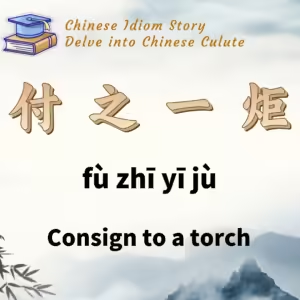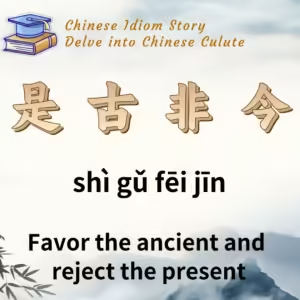
Chinese Idiom: 付之一炬 (Fu Zhi Yi Ju)
English Translation: Consign to a torch
pīn yīn: fù zhī yī jù
Idiom Meaning: To destroy something completely by burning it; to wipe out entirely.
Historical Source: Du Mu’s Efang Palace Ode (《阿房宫赋》) written during the Tang Dynasty.
Idiom Story:
Du Mu, a notable poet and scholar of the Tang Dynasty, was known for his criticism of the contemporary state of the Tang empire, which was plagued by corruption and decadence. In his work Efang Palace Ode, Du Mu used historical references to critique the excesses of his own time by drawing parallels with the fall of the Qin Dynasty.
The Efang Palace (阿房宫) was a grand palace commissioned by Qin Shi Huang, the first emperor of the Qin Dynasty, in 212 BC. Displeased with the modesty of the original palace in Xianyang, he began constructing a much larger and more opulent palace at Efang, located to the south of the Weihe River near modern-day Xi’an. However, the construction was never completed as Qin Shi Huang died before it could be finished. The palace was later destroyed by fire during the rebellion led by Chen Sheng and Wu Guang, which eventually led to the fall of the Qin Dynasty.
In the ode, Du Mu vividly describes the opulence of the unfinished Efang Palace and the extravagant lifestyle of its intended occupants. He then contrasts this with its ultimate fate:
“…The heart of the tyrant grew increasingly arrogant. The soldiers’ call, the fall of the Pass, the torch of the Chu people, lamentable scorched earth!”
Here, Du Mu uses the image of the palace being reduced to “scorched earth” by a torch to emphasize the complete and utter destruction of something once grand. The phrase “楚人一炬,可怜焦土” (Chǔ rén yī jù, kě lián jiāo tǔ) illustrates how the once magnificent Efang Palace was turned into mere ashes, symbolizing how the excesses and tyranny of a ruler can lead to complete ruin.
Over time, this expression evolved into the idiom “付之一炬” (fù zhī yī jù), meaning to burn something completely, reflecting the total annihilation or destruction of an object or concept by fire.






